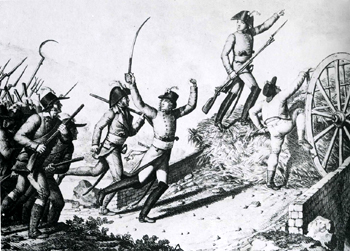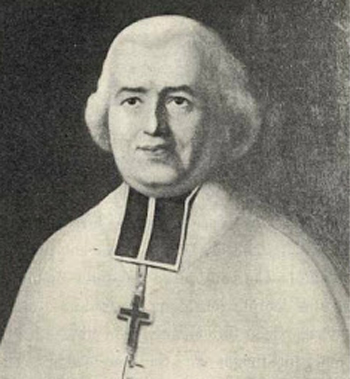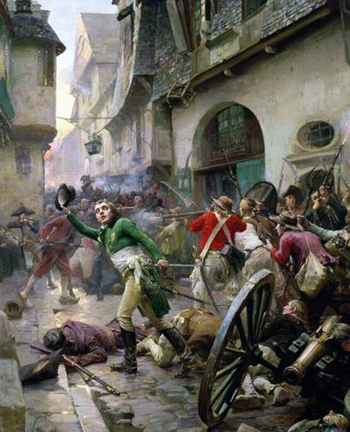Personalities
 |
 |
 |
 |
 |
 |
 |
Heroes of La Vendée - II
The First Victories of the Vendée
After that first triumphant victory led by the young Henri de la Rochejaquelein, the Vendéan Army marched on to Thouars, a rock-built town upon the banks of the Thouet. It was among the most impregnable places in all that region and was held by the Republican officer Pierre Quetineau with a considerable force.
 The royalist army advanced in in four divisions, one being under the command of la Rochejaquelein and his kinsman Louis Marie de Salgues, Marquis de Lescure, another hero of the Vendée. They marched to Vrine, a village near Thouars. On a bridge of the same name a short but furious encounter took place.
The royalist army advanced in in four divisions, one being under the command of la Rochejaquelein and his kinsman Louis Marie de Salgues, Marquis de Lescure, another hero of the Vendée. They marched to Vrine, a village near Thouars. On a bridge of the same name a short but furious encounter took place.
The ammunition failing, la Rochejaquelein rode off to obtain supplies. In his absence Lescure, hoping to take the bridge, rushed down the slope, but found himself alone. Vainly he implored his soldiers to follow him. Terror-stricken, they remained as it were rooted to the spot.
Suddenly a shout was heard, and la Rochejaquelein was seen advancing at full gallop. With a simultaneous movement the whole force immediately rushed down the declivity and carried the bridge. The army was now drawn up in several divisions before the walls of Thouars. La Rochejaquelein began the escalade, calling upon his men to follow him. There were no scaling-ladders at hand, yet some effort had to be made to reach the walls.
Mounting on the shoulders of a brave peasant named Tixier de Courlai, la Rochejaquelein gained the summit and with his own hands began to tear away the stones. A breach was thus effected, and the besiegers gained an entrance at the same moment that another division of the Vendéan troops had battered down the Pont-Neuf gate.
The republicans at once laid down their arms and cried for quarter. To the lasting praise of the Vendeans, justly angered as they were by a long course of cruelty and by provocation of every kind, they acted with remarkable moderation, showing mercy to Quetineau and all the prisoners.
The Battle of Thouars was won on May 5, 1793. Once inside the city they obtained reinforcements either of volunteers from among the republican troops or of royalists who had been in the town. They also came into possession of a quantity of artillery and ammunition, which they so much needed.
Battle of Chatillon
Having now gained some victories of minor importance, they hastened on to Chatillon, where 20,000 insurgents had assembled. It was on May 23. The royalists assisted at Mass, after which the Penitential Psalms were sung and the soldiers knelt to receive a last benediction.
Lescure, full of martial ardor, rushed alone against the enemy to encourage his division. He was greeted with a volley from the enemy's ranks which riddled his clothing and tore away his spurs. Undaunted, he cried out, "See, the Blues do not know how to shoot!"
The whole force now charged upon the enemy. In the very midst of the attack they knelt for a moment in prayer before a Cross that stood in their way. Some of the officers objected, but Lescure interposed: "Let them pray," he said, "they will fight none the worse for it."
The result of the combat remained for some time doubtful. The republicans bravely held their ground and disputed every inch of the field. But it was la Rochejaquelein with a few hundred men mounted on carthorses that turned the fortunes of the day by an irresistible charge.
On they rushed, meeting and repulsing the enemy's cavalry. The onslaught was terrible; and the republicans, entirely defeated, laid down their arms and retreated in utter disorder. The royalists forthwith made themselves masters of Fontenay without the slightest opposition.
The Abbé Bernier
It was just after this victory that the royalists resolved to appoint a supreme council of administration, of which the Abbé Bernier, better known as the Curé of St. Laud's, was one of the most distinguished and famous members.
 The council, after much deliberation, sent a proclamation from the Catholic armies to the Convention in which they declared "La Vendée victorious, the Holy Cross of Jesus Christ and the Royal Standard everywhere triumphant over the bloody flag of anarchy."
The council, after much deliberation, sent a proclamation from the Catholic armies to the Convention in which they declared "La Vendée victorious, the Holy Cross of Jesus Christ and the Royal Standard everywhere triumphant over the bloody flag of anarchy."
They added that the Vendée desired to keep forever the Holy Catholic, Apostolic and Roman Faith, and to have a King who would be a father within and a protector without."
In that proclamation a comparison was drawn between the conduct of the Vendéan and that of the revolutionary republican army in their progress through Brittany and the Bocage. However, this appeal was totally disregarded by the Convention.
New generals were sent into La Vendée to carry on the war, and among them were the celebrated Santerre and Westermann, who was known as the "Butcher of the Vendéans." (1)
Other Vendée victories
The fortunes of the Vendéans were still, however, in the ascendant. They gained three important victories at Doué, Vihiers and Montreuil. Concentrating their forces, they now marched on towards Saumur.
 While Lescure was engaged at Fouchard Bridge, Cathelineau feigned an attack upon the Castle, and la Rochejaquelein led on his troops to surprise the enemy at Varin meadows. Leaving a small force to guard the Bridge of St. Just, which lay exactly in front of the enemy’s camp, the young leader made an assault upon the rear.
While Lescure was engaged at Fouchard Bridge, Cathelineau feigned an attack upon the Castle, and la Rochejaquelein led on his troops to surprise the enemy at Varin meadows. Leaving a small force to guard the Bridge of St. Just, which lay exactly in front of the enemy’s camp, the young leader made an assault upon the rear.
Throwing his cap over the ramparts, he cried: "Soldiers, who will get me my cap?"
So saying, he leaped over himself, followed tumultuously by his men, while almost simultaneously the royalists entered the town from the opposite side. A portion of the revolutionary troops made a staunch resistance and attempted to hold the Castle.
Darkness came down upon the combat, but the Vendéan leaders determined that at dawn the enemy should be driven from their stronghold. When day broke it was discovered that the revolutionaries had fled during the night from Saumur under cover of the darkness.
Then the harmonious Long live the King clang of the bells delighted the hearts of the soldiers! Drums beat, clarions sounded Catholic religious shrill and high above the deafening shouts of "Vive la Religion Catholique!" "Vive le Roy” (Long live the Catholic Religion! Long live the King!)
One of the churches of the city had been made into a storehouse by the republicans, and the spoils of battle were now placed therein. On the morning after the victory la Rochejaquelein was found standing as in deep reflection, with eyes cast down.
A friend, approaching, asked him of what he was thinking.
"I am lost in astonishment," replied the young leader. "When I think of our success, it is clearly the hand of God."
Continued

Adapted from Names that Live in Catholic Hearts by Anna Sadlier,
NY: Benzinger Bros, 1882, pp. 220-228
Posted May 17, 2021

La Rochejacquelein & Lescure lead the Vendéens at the Battle of Thouars
The ammunition failing, la Rochejaquelein rode off to obtain supplies. In his absence Lescure, hoping to take the bridge, rushed down the slope, but found himself alone. Vainly he implored his soldiers to follow him. Terror-stricken, they remained as it were rooted to the spot.
Suddenly a shout was heard, and la Rochejaquelein was seen advancing at full gallop. With a simultaneous movement the whole force immediately rushed down the declivity and carried the bridge. The army was now drawn up in several divisions before the walls of Thouars. La Rochejaquelein began the escalade, calling upon his men to follow him. There were no scaling-ladders at hand, yet some effort had to be made to reach the walls.
Mounting on the shoulders of a brave peasant named Tixier de Courlai, la Rochejaquelein gained the summit and with his own hands began to tear away the stones. A breach was thus effected, and the besiegers gained an entrance at the same moment that another division of the Vendéan troops had battered down the Pont-Neuf gate.
The republicans at once laid down their arms and cried for quarter. To the lasting praise of the Vendeans, justly angered as they were by a long course of cruelty and by provocation of every kind, they acted with remarkable moderation, showing mercy to Quetineau and all the prisoners.
The Battle of Thouars was won on May 5, 1793. Once inside the city they obtained reinforcements either of volunteers from among the republican troops or of royalists who had been in the town. They also came into possession of a quantity of artillery and ammunition, which they so much needed.
Battle of Chatillon
Having now gained some victories of minor importance, they hastened on to Chatillon, where 20,000 insurgents had assembled. It was on May 23. The royalists assisted at Mass, after which the Penitential Psalms were sung and the soldiers knelt to receive a last benediction.
Lescure, full of martial ardor, rushed alone against the enemy to encourage his division. He was greeted with a volley from the enemy's ranks which riddled his clothing and tore away his spurs. Undaunted, he cried out, "See, the Blues do not know how to shoot!"
The whole force now charged upon the enemy. In the very midst of the attack they knelt for a moment in prayer before a Cross that stood in their way. Some of the officers objected, but Lescure interposed: "Let them pray," he said, "they will fight none the worse for it."
The result of the combat remained for some time doubtful. The republicans bravely held their ground and disputed every inch of the field. But it was la Rochejaquelein with a few hundred men mounted on carthorses that turned the fortunes of the day by an irresistible charge.
On they rushed, meeting and repulsing the enemy's cavalry. The onslaught was terrible; and the republicans, entirely defeated, laid down their arms and retreated in utter disorder. The royalists forthwith made themselves masters of Fontenay without the slightest opposition.
The Abbé Bernier
It was just after this victory that the royalists resolved to appoint a supreme council of administration, of which the Abbé Bernier, better known as the Curé of St. Laud's, was one of the most distinguished and famous members.

Abbé Bernier, one of the great leaders in the Vendéan glorious fight
They added that the Vendée desired to keep forever the Holy Catholic, Apostolic and Roman Faith, and to have a King who would be a father within and a protector without."
In that proclamation a comparison was drawn between the conduct of the Vendéan and that of the revolutionary republican army in their progress through Brittany and the Bocage. However, this appeal was totally disregarded by the Convention.
New generals were sent into La Vendée to carry on the war, and among them were the celebrated Santerre and Westermann, who was known as the "Butcher of the Vendéans." (1)
Other Vendée victories
The fortunes of the Vendéans were still, however, in the ascendant. They gained three important victories at Doué, Vihiers and Montreuil. Concentrating their forces, they now marched on towards Saumur.

‘Soldiers, who will get me my hat?’
Throwing his cap over the ramparts, he cried: "Soldiers, who will get me my cap?"
So saying, he leaped over himself, followed tumultuously by his men, while almost simultaneously the royalists entered the town from the opposite side. A portion of the revolutionary troops made a staunch resistance and attempted to hold the Castle.
Darkness came down upon the combat, but the Vendéan leaders determined that at dawn the enemy should be driven from their stronghold. When day broke it was discovered that the revolutionaries had fled during the night from Saumur under cover of the darkness.
Then the harmonious Long live the King clang of the bells delighted the hearts of the soldiers! Drums beat, clarions sounded Catholic religious shrill and high above the deafening shouts of "Vive la Religion Catholique!" "Vive le Roy” (Long live the Catholic Religion! Long live the King!)
One of the churches of the city had been made into a storehouse by the republicans, and the spoils of battle were now placed therein. On the morning after the victory la Rochejaquelein was found standing as in deep reflection, with eyes cast down.
A friend, approaching, asked him of what he was thinking.
"I am lost in astonishment," replied the young leader. "When I think of our success, it is clearly the hand of God."
Continued

- In a document Westermann wrote to the Committee of Public Safety he stated his brutal policy:
"There is no more Vendée, Republican citizens. It died beneath our free sword, with its women and its children. I have just buried it in the swamps and the woods of Savenay. Following the orders that you gave to me, I crushed the children beneath the horses' hooves, massacred the women who, those at least, will bear no more brigands. I do not have a single prisoner to reproach myself with. I have exterminated them all.”
Adapted from Names that Live in Catholic Hearts by Anna Sadlier,
NY: Benzinger Bros, 1882, pp. 220-228
Posted May 17, 2021
______________________
______________________





